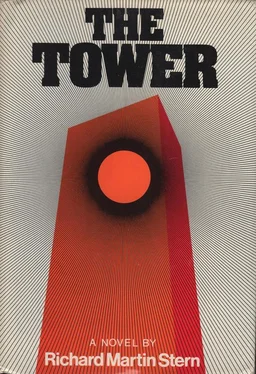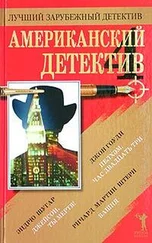Promptly the crowds began to gather again, hampering the firemen’s work. Police, Shannon and Barnes among them, moved the crowds behind the still-standing barricades. A kind of order was restored.
High up on the building’s gleaming side a plume of smoke appeared, dark and ugly against the sky. Strangers in the crowd pointed it out to one another, not infrequently with glee; there is a kind of joy in discovering that the high and mighty have their problems too.
On the television screen in Charlie’s Bar, the camera had begun the incredibly long climb up the building’s face, floor after floor, the whole foreshortening as the angle steepened.
“Beautiful damn thing,” Giddings said. “I hate to admit it to you, but it is. And we’ll find out tomorrow about those goddamned change authorizations, run them down, get things straight. I’ve talked with Bert McGraw and he says he’ll do whatever, and what Bert says, Bert does.” He was feeling almost friendly now. “You’re a prickly bastard sometimes, Nat Wilson, but I’ll have to say, even if you do get funny ideas, that by and large you know your trade. You—”
Giddings stopped suddenly. His eyes were still on the
TV screen. The camera now had reached the tower. It paused there, shiny structure plain, blue, blue sky the backdrop.
Giddings said in a voice that was not quite steady, “What’s that little plume of smoke? Just there. Below the tower.”
“I see it,” Nat said. He stared.
“Air-conditioning exhaust,” Giddings said. “Somewhere there’s smoke inside, and that means—Where do you think you’re going?”
Nat was halfway out of the booth. Giddings grabbed a fistful of Nat’s jacket and held it tight. “You son of a bitch,” Giddings said. His voice was low now. “You knew too much. All along, you—”
Nat broke the big man’s grasp with astonishing ease. He slid out of the booth and stood up. “I’m going to the job,” he said. “Are you coming or are you going to sit there on your fat ass?”
In the center of the plaza a battalion chief with a white hat directed operations through a bullhorn. Hoses snaked across the pavement. Water was beginning to gather in puddles on the concourse floor.
At the barricade, “Nobody allowed through,” Patrolman Shannon said. And then, “Well, what do you know? It’s you again.”
“Just get the hell out of the way,” Giddings said, and started forward.
Patrolman Frank Barnes appeared, his dark face solemn. “Easy, Mike,” he said to Shannon. And then to Giddings and Nat, “Orders. I am sorry.”
And here came a new siren sound wailing up the street, a black limousine, red light flashing. Assistant Fire Commissioner Brown was out of-the car before it stopped. He was hatless and his red hair flamed. He walked with the awkward stride of a long-legged animal; a stork came to mind, an angry stork. He stopped in front of Nat.
“Were you just guessing or did you know this was going to happen?”
It was a question that was going to be asked again and again, Nat thought, and knew no way to stop it. “Does it matter now?” he said. “You’ve got a fire and we’re here to do what we can.”
“Which is exactly what?”
“I don’t know, but between us we know this building better than anyone who isn’t inside it.” He was thinking of Ben Caldwell, of course, and Bert McGraw. But they were top echelon. He and Giddings were the men on the job with the intimate knowledge only day after day and month after month of living with the structure could provide. “And,” he said, “maybe better than they do at that.”
“All right,” Brown said. “Come on, but stay out of the way.”
Shannon opened his mouth to protest. Frank Barnes held him silent with a gesture. “Good luck,” Barnes said. He paused. “I mean that.”
Brown walked straight to the white-hatted battalion chief in the center of the plaza. “What’s the story?”
“We haven’t found where it started, yet. Third floor, fourth floor.” The chief shrugged. “It had a start, just the hell of a start, too much of a start.”
Giddings said, “Sprinklers?”
The chief looked at him carefully. “Sprinklers,” he said, and he nodded. “They help. Most fires that start they contain. This one they didn’t.”
“And that,” Nat said, “means what?”
“I wouldn’t know what it means,” the chief said. “When its all over, I hope, we may be able to find out. Sprinklers just make some fires worse. Potassium, sodium, electrical fires, gasoline fires—water can be bad.”
Nat said slowly, “Potassium, sodium—that means a bomb?”
“Possibly.” The chief raised his bullhorn. “More hose! Move it in!” He lowered the bullhorn. “The smoke’s heavy and that could mean anything too.”
Giddings said, “You said electrical fire was a possibility too.” He looked at Nat.
“God knows,” Nat said. “Third floor, fourth floor—”
He shook his head. “They’re not mechanical floors.” He was silent.
Brown said, “The Commissioner’s up in the Tower Room. And the mayor.”
“And,” Giddings said, “more other brass than you can count.”
Brown ignored him. To the chief, “Shall we bring them down? There’s a phone. And just two of those express elevators will do it.”
“It’s a hell of a walk,” Giddings said, “in case you’re thinking of getting them down any other way. That building core where the elevators are is safe as anything can be.”
They felt, then, rather than heard the sudden explosion almost beneath their feet. Sound, dull and distant, came a moment later, like a closet door closing hollowly with enormous force. The puddles of water on the concourse floor rippled gently. The interior lights were suddenly dead.
Giddings said softly, “Jesus!”
Brown looked at Nat. “That means what?”
Nat closed his eyes. He opened them again and shook his head to clear away the cobwebs of shock. He said slowly, “The guts of the building are down there, everything that drives it and makes it live.”
“Down in those subbasements,” the battalion chief said, “is where the primary power comes in, right?”
Nat nodded.
Giddings said again, “Jesus!”
“Right from the substation,” the battalion chief said. “At eight, ten thousand volts.” He raised the bullhorn and sent men scurrying down into the bowels of the building.
“Thirteen thousand eight hundred, to be precise,” Nat said. “And I’m not an electrical engineer, but if somebody monkeyed with those big transformers, oh my God!” He was silent, motionless, staring into the concourse. “Come on,” he said softly, “come on!”
Brown was frowning. “Come on who, what?”
“Standby generators,” Giddings said. “If they function, we’ll at least have power for the elevators.”
Brown said quietly, “And if they don’t?”
“Then,” Nat said, “you’ve got a Tower Room filled with important people a hundred and twenty-five floors above a fire. And if it gets out of control—”
“It won’t,” the battalion chief said.
“It will,” Giddings was looking at Nat. “What are you thinking?”
“That was an explosion,” Nat said. “Bomb? Maybe. But what about an enormous short in a primary circuit? You’ve heard a hundred-and-ten-volt light fixture short out?”
There was silence. Giddings said, “Go on, goddammit, what are you thinking?”
“I told you I wasn’t an electrical engineer,” Nat said, “but, damn it, what about an overload because of a short? How long does it take with that kind of power to overheat wiring—particularly if it’s substandard wiring?”
The battalion chief said, “Substandard?” He looked from one man to another.
Читать дальше










